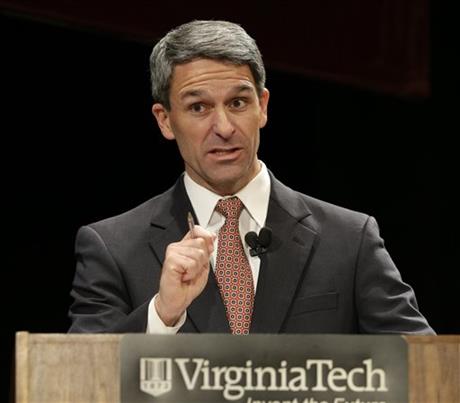
By PHILIP ELLIOTT and KEN THOMAS
FILE – In this Oct. 24, 2013 file photo, Virginia Republican gubernatorial candidate, Virginia Attorney General Ken Cuccinelli, speaks in Blacksburg, Va. Women may hold the key in Virginia’s slash-and-burn race for governor, rendering a final judgment on a campaign marked by fights over social issues. (AP Photo/Steve Helber, File)
Terry McAuliffe
FILE – In this Oct. 27, 2013 file photo, Virginia Democratic gubernatorial candidate Terry McAuliffe campaigns in Dale City, Va. Women may hold the key in Virginia’s slash-and-burn race for governor, rendering a final judgment on a campaign marked by fights over social issues. (AP Photo/Molly Riley, File)
Prev
1 of 2
Next
RICHMOND, Va. (AP) — Women may hold the key in Virginia’s slash-and-burn race for governor, rendering a final judgment on a campaign marked by fights over social issues.
Democrats have not relented in their criticism of Republican Ken Cuccinelli’s positions on abortion, women’s reproductive health and even divorce, and it’s taken a toll, especially among female voters. Polls show Cuccinelli consistently struggling to connect with women in his race against Democratic Terry McAuliffe.
Heading into Tuesday’s election, the cash-poor Cuccinelli campaign is trying to set the record straight at every stop, with the state attorney general telling allies, “The truth is our friend here.”
The timeline is not.
In the race’s waning days, Cuccinelli is essentially silent in paid television ads.
He plans to urge supporters to tell their neighbors, especially women, that he’s a better candidate for them. The former state senator talks about his wife and daughters at every chance, and how he formed the first sexual assault-prevention group when he was an undergraduate at the University of Virginia, after his roommate was a victim.
But time is running out. He’s facing a massive deficit on campaign advertising, and he was outspent by a margin of 25-to-1 for most of the week. A late-week ad buy cut in that, making it a 10-1 margin.
Polls show major hurdles with female voters. A Quinnipiac University poll last week found women backing McAuliffe by 50 percent to 37 percent. An earlier Washington Post poll showed Cuccinelli trailing among women, 34 percent to 58 percent.
McAuliffe has seized upon Cuccinelli’s legislative record involving issues closely watched by women, from reproductive health and abortion to Cuccinelli’s opposition to no-fault divorce. In advertising, McAuliffe has used these issues to argue that Cuccinelli would try to interfere in the private lives of voters.
Cuccinelli has opposed abortion unless a mother’s life is at risk. As attorney general, he forced the state’s Board of Health to reverse a decision last year to exempt existing abortion clinics from a new law that required them to meet the same architectural standards as new hospitals.
McAuliffe has aired advertising highlighting Cuccinelli’s support for the “personhood” bill, a 2007 measure that would have added to the state’s constitution that “life begins at the moment of fertilization.” Medical organizations said the legislation could limit a woman’s ability to access contraception, including birth control.
Another ad focused attention on a Cuccinelli bill that would make it more difficult for couples with minor children to get a divorce.
Democratic strategists who have worked in Virginia said the context has been important. The campaign followed high-profile legislation in 2012 that would have forced women to undergo vaginally invasive ultrasound exams before having abortions.
Cuccinelli opposed making the procedure mandatory but supported a requirement that if the procedure were performed, the results would be shared with the patient. The procedure was deleted from the bill in favor of a mandated external ultrasonic exam and became law, but it remains unpopular with many voters.
“That made a lot of the Cuccinelli background and a lot of the Cuccinelli positions a lot more relevant to voters,” said Pete Brodnitz, a Democratic pollster who has worked for U.S. Sen. Tim Kaine, D-Va.
That’s opened the door for McAuliffe to borrow a page out of the Barack Obama playbook.
Running up strong margins among women has turned into the template for Democrats in competitive states such as Virginia. Obama won among female voters in Virginia by 9 percentage points in the 2012 presidential race and 7 percentage points in 2008, driving him to victory in the swing voter state.
Obama won double-digit majorities among female voters in Iowa, Wisconsin, Nevada, New Hampshire, Pennsylvania and Ohio in 2012, compensating for losing the male vote in those states. In each of these competitive states, women comprised more than 50 percent.
Turnout this year could be as low as 30 percent, although both campaigns are anticipating it to be closer to 40 percent. The lower the turnout, the better the chances for Cuccinelli because his loyal conservative base is more likely to show up on Election Day, while Democrats could be complacent given McAuliffe’s lead in most public polling.
That’s why McAuliffe, even Friday, was reminding voters of Cuccinelli’s positions on women’s health issues.
“I will be a brick wall,” McAuliffe pledged during a conference call. “I trust women to make their own choices.”
By contrast, in 2009 Republican Bob McDonnell placed less emphasis on his social views and presented himself as a job-focused centrist. During that campaign, the Republican was tripped up by reports of a master’s thesis he wrote in the 1980s that argued working women and feminism was “detrimental” to the family.
McDonnell’s campaign helped defend his record by airing ads that featured McDonnell’s three daughters, and he got help from women who worked with McDonnell. The Republican scored a sweeping victory against Democrat Creigh Deeds, winning among female voters.
Cuccinelli is hoping for the same and casts the health care overhaul as a worry for women.
Women, he said, “don’t like it when they’re threatened with the federal government taking their doctor away, taking their health insurance away, taking their choices away.”


